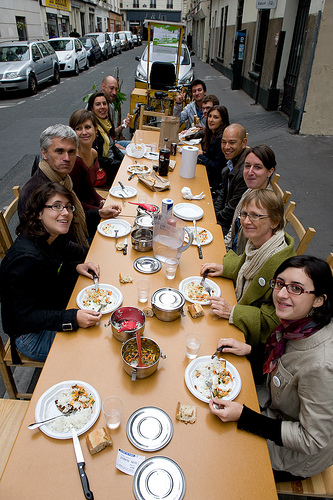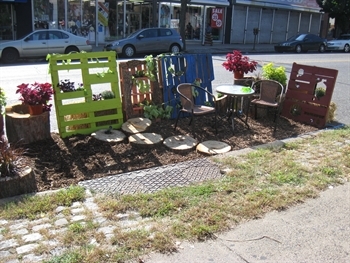
Turning our perceptions of parking space upside down with International Park(ing) Day
 By Marisa Novara and MPC Research Assistant Jason Brown
By Marisa Novara and MPC Research Assistant Jason Brown - October 7, 2013
For the past few years, Metropolitan Planning Council (MPC) has been covering the evolving phenomenon of Park(ing) Day, the third Friday in September that is now celebrated globally as a day to take back the streets by temporarily claiming parking spaces as people places. Park(ing) Day is not only a fun opportunity to play with urban space in a different way, but also a challenge for cities to think about their design on a human scale, to move away from car-oriented planning policies and to highlight local cultural and commercial assets.
It’s great to see that MPC is not alone in championing these values. In the past few years, Park(ing) Day has provided the platform to prove that these ideas are global phenomena. As you can imagine, there are many ways to approach public space development, but there are some specific examples from around the world that encourage us to activate by advocating, collaborating and even competing to create better places for our region’s residents. In this series, MPC will examine how these three different methods played out across the world.
Collaborate: France and Philadelphia

A table set for progress on the streets of Paris during Park(ing) day 2012.
Dedale
Cities throughout France benefit from an incredible Park(ing) Day network organized by European design and research group Dédale. With over 100 participating groups, France is covered; Dédale has the resources and creativity to bring the public and the experts together. The biggest events happen in Paris, where not only are streets and plazas activated with art and debate, but the residents work together on the ongoing Green Paper project, which compiles open-source research and discussion on the collaborative city, the green city, the innovative city, the re-enchanted city and the mobile city. The Green Paper, to be published this year, began in 2011 as a way to inform France’s approach to progressive public space.

Serene green adjacent to the street in Philadelphia.
Pam Zimmerman
Here in the States, Philadelphia also engages catalytic collaboration. Pam Zimmerman of Zimmerman Studio, a private architectural firm, heard about the event back in 2008, and her interest turned into leadership. Ever since, she and her firm have steered Philadelphia’s very successful installation, shepherding over 40 park-ers while playing nice with the City’s Parking Authority. Surprisingly, while Park(ing) Day is often posed as a (peaceful) protest against the streets, the Parking Authority has proven a helpful ally, waiving fees for the parking spaces, pointing out safe zones and even creating a parklet of its own in past years.
As many voices become one, these inspiring efforts speak to a less cloistered and wider popular movement to appropriate public space for the people, not their cars.